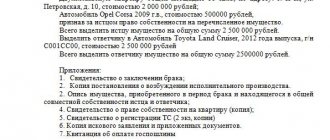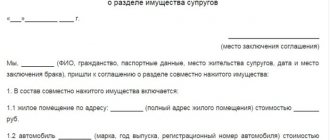Love between a man and a woman, which naturally leads to marriage, does not at all imply complete neglect of the material side of family life. As well as the loss of financial independence by spouses from each other.
Owning personal property in marriage (as well as dividing income or repaying debts to each other) is not prohibited, but, on the contrary, is encouraged.
Therefore, marital division of property is not necessarily a quarrel and divorce. The law provides for various ways of dividing common property. It is quite acceptable to divide material values among each other and continue a harmonious life together.
Is property divided without divorce?
The need to divide property can be associated with a variety of life circumstances, and divorce is just one of the reasons. It happens that people, while married, do not actually live together, and therefore they need to decide who owns what property. It also happens the other way around, when peace and harmony reign in the family, but it is in the interests of both spouses to divide their joint property. When considering the question of whether it is possible to divide jointly acquired property without a divorce, it should be taken into account that there is so-called indivisible property:
- received (gifted) or acquired before marriage;
- personal belongings of spouses;
- things purchased to provide for children;
- bank deposits for minor children;
- rights to the results of intellectual work.
Even if the spouses were married, but at the time of acquiring the property they actually lived separately, the court may recognize such property as personal property, which means that it will not be subject to division.
Otherwise, jointly acquired property (bank deposits, luxury goods, movable and immovable property, and so on) will be subject to division.
○ General procedure for dividing property during a divorce.
Before talking about the division of property, it should be said that divorce and division of property are concepts whose relationship is not absolute. The fact is that spouses can divide property during marriage (voluntarily or at the request of a creditor against one of them).
In addition, the divorce itself, even if it occurs in court (this procedure exists if children were born in the marriage), does not provide for the automatic division of property: the former spouses need to deal with this separately, including such a claim in the claim for divorce or making a division ourselves.
✔ How is common property divided?
By law, shares in property that were joint during the marriage are considered equal. The income level of each spouse does not matter. However, in a number of cases deviation from this principle is allowed:
- If the spouses entered into a marriage contract or some other agreement that part of the property is transferred to the personal property of one of the spouses.
- Items purchased exclusively for minor children (clothing, books and textbooks, children's furniture, etc.) are not subject to division. These items are received by the spouse with whom the children remain.
- If the division occurs in court, the court has the right to increase or decrease the share of one of the spouses. This is possible both in the interests of the spouse with whom the minor children remain, and in some other cases. For example, if one of the spouses spent money to the detriment of the interests of the family and had no income without good reason, his share will be reduced; if the spouse could not earn money due to illness or other emergency circumstances, the court may increase his share.
- If some property was acquired, even during marriage, but with funds received by one of the spouses before marriage, the court may recognize this property as personal property that is not subject to division.
[ ]
✔ Procedure and procedure for dividing common property.
It is assumed that property issues, like other family problems, are resolved within the family by spouses by mutual consent. This fully applies to the division of property. Both during a divorce and before it, a husband and wife have the right to determine for themselves what specific things belong to which of them, by concluding an agreement on the division of property and having it certified by a notary in order to avoid disputes in the future.
However, unfortunately, peaceful division does not always occur. And if there is a dispute about property between spouses, they can go to court with a corresponding claim.
It must be taken into account that if the division affects the interests of third parties, the court may separate the dispute over such property into separate proceedings. Then this case will be considered separately, without connection with the divorce and division of the remaining property.
Based on the results of the meeting, the judge makes a decision in which he determines which of the disputed items belongs to which of the spouses. In the same case, if the thing cannot be divided, and its value clearly exceeds the share of the spouse, the court has the right to give it to someone alone, but with payment to the other spouse of the difference in value between the value of the thing and the value of the share.
[ ]
✔ Division of personal property.
As I already said, in addition to joint property, spouses can also have personal property. This property, in general cases, is not subject to division and remains the property of the spouse to whom it previously belonged.
In order not to repeat ourselves, we can only add that, in addition to gifts, personal property includes everything received through gratuitous transactions (for example, privatization, etc.). In addition, the court may classify as personal property items acquired by one of the spouses after their cohabitation has ceased. However, in this case, the court will need evidence that, for example, a particular washing machine was purchased by the wife, even before the divorce, but after the husband left the family and only at her own expense. How exactly such questions are proven will be discussed below.
[ ]
✔ Required documents.
If the divorce case has reached the judicial division of property, then evidence will be required . However, since the spouses can own virtually anything, it is difficult to determine in advance the list of necessary documents that will need to be presented in court. However, there are some that will be required anyway:
- A certificate of marriage and, if the division occurs after a divorce, of its dissolution.
- If children were born in the marriage - birth certificates.
- List of property subject to division. It must be remembered that the court will only make a decision regarding what is included in this list. If the plaintiff loses sight of something, he will have to divide this thing separately - by agreement or in separate legal proceedings. It is highly advisable to indicate (even approximately) the value of the property in the list.
- Copies of documents for certain expensive items. There can be anything here: certificates of ownership or extracts from the Unified State Register of Real Estate for real estate, registration certificates for cars, checks and receipts for the purchase of expensive household appliances or furniture, bank account statements, etc.
- If during the process it is intended to increase the plaintiff’s share, then documents proving the need for such an increase (in case of illness - copies of medical documentation, etc.).
More details on how exactly the division of specific types of property occurs will be discussed below. It should also be remembered that not only documents can be used as evidence. For example, if we are talking about the actual termination of family relations before marriage, witnesses may be called to court, and the court is obliged to take their testimony into account.
[ ]
What applies to joint property of spouses
In accordance with Article 34 of the Family Code of the Russian Federation, the common joint property of spouses includes all property acquired during marriage, namely:
- income from labor, entrepreneurial or intellectual activities;
- pensions, benefits and other payments;
- movable and immovable property;
- securities;
- cash and bank deposits.
Determination of shares when dividing the common property of spouses, as a rule, is made according to the principle of equality of each of the couple, that is, equally. At the same time, since each case is purely individual, the specific composition of property and the procedure for its distribution between spouses is determined by the court.
The law provides that a woman who is engaged in housekeeping has an equal right to a share in jointly acquired property with a working man. Thus, in order for property to be considered jointly acquired, it does not matter who exactly purchased this or that item, the main thing is that the purchase took place during the marriage.
So, for example, when the question arises whether a car purchased during marriage, but registered in the name of the husband, is divided, the key point will be that the car was purchased during the marriage, and not who exactly purchased it and to whom it was registered. In other words, during a divorce, the wife has the right to a car to exactly the same extent as the husband, even if during the entire period of cohabitation the car was used exclusively by the husband.
Find out in more detail what constitutes personal property of spouses.
The procedure for dividing the common property of spouses
Spouses can divide property voluntarily, in the absence of a dispute, and in this case they enter into an agreement on the division of property, which, if they wish, can be notarized. Under such an agreement, property can be divided in both equal and unequal shares, but at the same time the interests of third parties (children, creditors) should not be infringed.
If the spouses cannot divide the property peacefully, then the division is carried out by the court. After a divorce, claims for division of property are subject to a general statute of limitations of three years. By virtue of the general rule established by paragraph 1 of Article 200 of the Civil Code of the Russian Federation, the limitation period begins from the moment when the person learned (should have known) about the violation of his right. Consequently, the statute of limitations should be calculated not from the moment of termination of the marriage, but from the day when the spouse learned (should have known) about the violation of his right to property.
Each spouse has the right to demand the division of common property both upon divorce and during marriage, and the shares are assumed to be equal. When dividing residential premises, which are the common joint property of the spouses, the court determines which rooms belong to each of them. In cases where one of the spouses is given rooms whose value exceeds his share, the other spouse must be awarded appropriate compensation.
When dividing certain types of property, problems arise due to the fact that this property cannot be divided in kind. If the apartment is in common joint ownership of the spouses, it can be “divided” between them in the following ways:
- peaceful way - concluding an agreement to exchange this apartment for two (or several) other apartments;
- sale of the apartment and division of money in half (this option can occur either by mutual agreement of the spouses or in court if one of the spouses objects to this option);
- section of the apartment in kind.
First, the court determines the shares of each spouse in this apartment and these shares, as a rule, are recognized as equal. The cost of an apartment in the event of its division is determined by the market value, and not by the BTI assessment. For this purpose, it is possible to appoint an appropriate examination with the involvement of specialists from real estate offices. The mere recognition by the court of a spouse’s ownership of real estate does not make him the owner - this right must be registered in accordance with the procedure established by law.
An unfinished apartment (house) is also subject to division (depending on the degree of completion of the house - if this is technically impossible, the object is not classified as real estate). The Judicial Collegium for Civil Cases of the Supreme Court of the Russian Federation states the following: upon the claim of spouses who jointly built a house, the court has the right to divide an unfinished house if, taking into account the degree of its readiness, it is possible to determine the individual parts to be divided with the subsequent technical possibility of completing the construction of the house . If it is impossible to divide an unfinished house, the court may recognize the right to building materials and structural elements of the house. Here is a similar example: a magistrate granted a claim for recognition of ownership of 1/2 of a residential building that was not put into operation.
The case materials contained a certificate from the BTI, which confirmed that the house was 92% complete, and a certificate from the gas company stating that gas was running at this address and there was gas equipment: a 4-burner gas stove and a heating gas boiler. Witness testimony confirmed the presence in the house of heating, lighting, water supply and sewerage in working order, fully glazed windows, floors in living rooms, walls covered with wallpaper. The couple were erecting a residential building on the site of an old, dilapidated building, acquired under a purchase and sale agreement, after receiving the appropriate resolution from the head of the administration on permission for reconstruction. The court considered that each of the parties could independently complete the construction after recognizing ownership of 1/2 of the house and put it into operation.
Federal Law No. 135-FZ of July 29, 1998, referring to the objects of assessment as “individual material objects (things); the totality of things that constitute a person’s property, including property of a certain type (movable or immovable, including enterprises); ownership and other real rights to property or individual items from the property; rights of claim, obligations (debts); works, services, information; other objects of civil rights in respect of which the legislation of the Russian Federation establishes the possibility of their participation in civil circulation”, determines that an assessment of the objects of assessment is mandatory when dividing the property of divorcing spouses at the request of one of the parties or both parties in the event of a dispute about the value of this property .
Federal Law No. 135-FZ of July 29, 1998 establishes that an assessment of an object of assessment, including a repeated assessment, can be carried out by an appraiser based on a court ruling. At the same time, the right to conduct an assessment of the object of assessment is unconditional and does not depend on the procedure established by the legislation of the Russian Federation for the implementation of state statistical accounting and accounting and reporting. Thus, if there is no agreement regarding the value of the divisible property, the claiming spouse has the right to file a petition with the court for an assessment of this property.
Living space can be divided between spouses if it is technically possible to divide the living space and equip a separate entrance. If such a division is impossible, the court has the right, at the request of the plaintiff, to determine the procedure for using the residential premises. A conclusion on the possibility of dividing a house in kind with technically acceptable options is provided by a construction and technical examination carried out on behalf of the court.
“When filing an application for division of property, it is reasonable and advisable to ask the court to seize the disputed property and begin collecting evidence on the presence of common family property. For example, property acquired during marriage or built during marriage (house, dacha, other real estate) is subject to division. Each party has the right to evaluate this property. If the second spouse does not agree with the assessment made, he has the right to invite his own appraisers. If an appropriate compromise is not found between the spouses regarding the valuation of common property, then the dispute regarding the valuation and division of property is subject to judicial resolution.”
Property acquired by spouses includes both acquired through transactions and manufactured or created by spouses - a built house, built utility premises, etc. With regard to income from royalties and ownership rights to works created by the author, the question arose as to whether it should also be taken into account distinguish between different cases of their receipt depending on when the thing for which they were received was created - before marriage or during marriage, and whether, in connection with this, it is not necessary to establish a different legal fate of income for these situations.
It is believed that it is unacceptable to decide the issue of including income from the results of intellectual activity in the common property depending on the time of creation of a work, invention and other similar objects - before or during marriage. If a married author systematically received payments in the form of a certain percentage of the revenue of the user organization for the transferred right to distribute the work he created before marriage, this money belongs only to the author himself, even being the main source of livelihood for both spouses. However, then any payments to the author for the right to use the work created during the marriage after the divorce may be subject to division between the author and his former spouse, even if these payments are permanent and are made systematically for many years after the divorce. Approaching the issue in this way can unreasonably worsen the position of the author in comparison with the worker and employee. Neither in theory nor in law enforcement practice does the question of recognizing the work itself performed under an employment contract as property (common or separate) be raised. The opinion of most lawyers on this issue boils down to the following: “Remuneration issued during the marriage, even if the creative work began and was completed before the marriage, is included in the common property of the spouses. Conversely, remuneration received after a divorce for a work of creativity created during the marriage does not apply to the joint property of the spouses. The exception is cases where a creative worker could receive a remuneration, but did not want to do so, expecting to receive it after a divorce.”
Most experts regarding the moment from which the spouses’ income in question should be recognized as their common property believe that it is most correct to consider as an object of the spouses’ common property the funds and other income they received during the marriage from any income-generating activity. The common property of spouses should include income from the moment of its actual receipt by the spouse who is entitled to this through the relevant legal relations.
When determining the legal regime of a created thing: a painting, sculpture, designer jewelry, an object of intellectual property, moreover, an object made during the marriage for one’s own needs, and not for sale, believes A.V. Slepakov, a separate regime should be recognized - the created thing has an author who is endowed with the corresponding rights regardless of the family status: he can sell the thing, donate it, destroy it, etc., but the money received from the sale of the thing or idea belongs to the family for right of common property. For example: the artist’s wife demanded that during the division, paintings created by her husband during the marriage, the value of which, according to experts, was very significant, be included in the common property; the court, having established that the paintings were not presented to the wife, refused to satisfy this requirement on the basis of paragraph 1 of Article 218 of the Civil Code of the Russian Federation: each of the spouses has the right of ownership to a new thing made or created by him for himself in compliance with the law and other legal acts. It is possible that the court’s decision may be different if funds from the family budget were used to produce the paintings (for example, expensive canvas and paints made using special technologies). In these cases, it is proposed to be guided by paragraph 1 of Article 220 of the Civil Code of the Russian Federation, according to which the subject of property rights is determined depending on what is greater - the cost of materials or work, taking into account its creative nature. Settlements between spouses are made according to the rules of paragraph 2 of Article 220 of the Civil Code of the Russian Federation.
In accordance with Article 39 of the RF IC, the shares of spouses are recognized as equal, but there are exceptions to this rule:
- when it comes to the interests of minor children;
- cases in which one of the spouses did not work (did not receive income) for unjustified reasons, in other words, parasitized at the expense of the other spouse;
- reduction of the spouse's share due to the expenditure of common property to the detriment of the interests of the family (expensive hobbies - tennis, skiing, collecting antiques; addiction to gambling, in some states pathological addiction to gambling is considered as a disease and limits the citizen's legal capacity in case of alcohol abuse and drugs);
- serious illness or disability of one of the spouses.
First, the court determines the shares in the ideal shares in the right, and then, at the request of the spouses, a natural division of property is carried out and it is determined which things are awarded to which of the spouses. The court will, of course, take into account the presence of minor children, the professional activities of the spouses, the state of health of the spouses, their lifestyle, and much more. If it is impossible to divide the property exactly in accordance with the shares, the court may transfer a larger share to one of the spouses, and in this situation, the other spouse has the right to receive monetary or other property compensation from such spouse. Another problem is the impossibility in some cases of dividing property in kind, for example an apartment or a residential building. In this case, a division is made in ideal shares, and each spouse has the right to use and dispose of it in accordance with the allocated share.
Debt encumbrance is a popular way of derogating from equal shares in marital property. Fictitious agreements, loans and credits allegedly spent on the general needs of the family reduce the share of the property of the bona fide spouse. Therefore, credit agreements (loans) must be agreed in writing with the other spouse.
In addition to things, the so-called “rights of claim” - loans and debts - are also subject to division. Claims can be embodied in receipts, bills, and securities. All of this also constitutes an asset of the estate and is distributed accordingly.
It is difficult to allocate a share in the authorized capital of various partnerships and companies. In kind, it is, as a rule, impossible to divide them; in order to own them, the spouse must be accepted as a member of a given company or partnership, so here it is possible to pay the spouse monetary compensation, or the participating spouse must withdraw from the membership, transfer his share to a third party and divide the received share of the money funds with your spouse.
The RF IC and the RF Civil Code specifically regulate situations related to the division of property in the event that one of the parties is an incapacitated spouse. An incompetent person cannot marry, but if this happens, then such a marriage will be declared invalid by the court. The legal consequences of an invalid marriage lead to the invalidity of the marriage contract, the division of jointly acquired property on a shared basis, etc. The guardian of an incompetent person may insist on recognizing his ward as a bona fide spouse (this is the spouse whose rights were violated by the marriage (clause 4 of Article 30 of the RF IC), and then the court will have the right to apply to the relations of the parties other provisions that are more beneficial for the incapacitated person spouse. The guardian has the right to bring a claim against the ward's spouse to recognize transactions made by him in relation to the common property of the spouses without the consent of the guardian as invalid. For example, the wife of a person suffering from a mental disorder disposed of a car purchased during the marriage. The spouse's mother, having learned about her son's illness, applies to the court to declare him incompetent, and she is appointed guardian of her son. The guardian can challenge this transaction if he proves that the acquirer knew or should have known about the lack of consent to the transaction. In the future, transactions will take place with the consent of the guardian.
In connection with the development of private entrepreneurship, the division of this type of common property as a business company is of particular interest. A legal entity, being a subject and not an object of civil law, does not belong to its founders by right of ownership. The scope of the rights of the founder in relation to the legal entity established by him (and the property of the latter) depends primarily on the organizational and legal form of the established organization and is regulated by the relevant provisions of the law and the charter of the enterprise.
Article 34 of the RF IC directly determines that securities and shares in capital belong to the common property of spouses. On the other hand, there is an opinion that shares of a closed joint stock company or shares of an LLC cannot be divided without the consent of the participants, since this entails the emergence of a new participant, which is legal only with the consent of the other participants.
All property and non-property rights provided by shares or shares (including the right to manage activities, the right to a share of profits or dividends) also belong to both spouses. The spouse who is the “actual” member of the LLC or CJSC, in this case, exercises powers in relation to their common property on behalf of both spouses. Based on the foregoing, it is possible to assert that when dividing shares of a closed joint stock company or shares of an LLC, the spouse of a participant cannot be considered as a new participant, since he already initially had the right of ownership to these shares or shares. Therefore, it is hardly correct to say that a spouse who is not a founder has the right only to monetary compensation, since this deprives him of part of the rights associated with the ownership of shares or shares, including the receipt of dividends (part of the profit) in the future.
When registering the powers of a spouse who received part of the shares or shares during the division of property, in order for him to exercise his rights as a participant in a closed joint-stock company or LLC, respectively, they are guided by the relevant provisions of the law.
According to the Federal Law of February 8, 1998 “On Limited Liability Companies”: “a company participant who intends to sell his share or part of the share in the authorized capital of the company to a third party is obliged to notify in writing about this the other participants of the company and the company itself by sending through the company at its own expense, an offer addressed to these persons and containing an indication of the price and other conditions of sale. An offer to sell a share or part of a share in the authorized capital of a company is considered received by all participants of the company at the time it is received by the company. Moreover, it can be accepted by a person who is a member of the company at the time of acceptance, as well as by the company in cases provided for by this Federal Law. An offer is considered not received if, no later than the day it is received by the company, a member of the company receives a notice of its withdrawal. Revocation of an offer to sell a share or part of a share after its receipt by the company is allowed only with the consent of all participants of the company, unless otherwise provided by the company's charter.
Participants of the company have the right to exercise the preemptive right to purchase a share or part of a share in the authorized capital of the company within thirty days from the date of receipt of the offer by the company. The charter may provide for a longer period of use of the pre-emptive right to purchase a share or part of a share in the authorized capital of the company.
If the company's charter provides for the company's pre-emptive right to purchase a share or part of a share, it must establish the terms for the use of the pre-emptive right to purchase a share or part of a share by the company's participants and the company.
If individual members of the company refuse to use the preemptive right to purchase a share or part of a share in the authorized capital of the company or use the preemptive right to purchase not the entire share offered for sale or not the entire part of the share offered for sale, other participants of the company may exercise the preemptive right to purchase the share or part of the share in the authorized capital of the company in the relevant part in proportion to the size of their shares within the remaining part of the period for exercising their pre-emptive right to purchase a share or part of a share, unless otherwise provided by the charter of the company.
The preemptive right to purchase a share or part of a share in the authorized capital of the company from a participant and, if the company’s charter provides for it, the preemptive right to purchase a share or part of a share from the company from the company terminates on the day:
- submitting a written application for refusal to use this preemptive right in the manner prescribed by this paragraph;
- expiration of the period for using this preemptive right.
Applications from company participants to refuse to use the preemptive right to purchase a share or part of a share must be received by the company before the expiration of the period for exercising the said preemptive right established in accordance with paragraph 5 of this article.”
The CJSC must make a corresponding entry in the register of shareholders on the basis of a judicial act (upon submission of a writ of execution and a copy of the decision). The refusal to make an entry may be appealed in court.
When dividing shares, it is necessary to evaluate the value of the shares (shares). In the absence of an agreement on the value of the property, the nominal value of the share or the size of the share is not fundamental at all, although, on the other hand, the courts sometimes use exactly this method, which is hardly indisputable. Another position, which is confirmed both in the scientific and methodological literature and in judicial acts, is that when determining the value of shares, their market price should be taken as a basis. The exchange value of shares is the most adequate reflection of the “market price” of a share, which allows us to speak about the possibility and legitimacy of determining the market value of a share based on quotes. However, not all shares are quoted on the stock exchange, and for shares of a closed joint stock company this is impossible in principle. Therefore, for shares that do not have quotations, a method can be applied based on the provisions of Federal Law No. 208-FZ of December 26, 1995, which establishes that the market value of the company’s property, including the company’s shares, is determined by a decision of the board of directors. The procedure for determining the market value of shares upon their acquisition and redemption by a joint stock company is of general importance. Therefore, the market value of shares determined by the Board of Directors can also be used in determining the property to be divided.
Transactions on the alienation of shares (shares) must be agreed upon with the spouse. In addition to the alienation of shares, other transactions with shares (shares) are also possible. For example, their conversion (convertibility of shares and bonds, the possibility of exchanging one type for another on the securities market), presentation for redemption, transfer to trust management, acceptance of an obligation to purchase placed shares or shares announced for placement (transfer), etc.
Direct management of the company requires certain transactions with shares. The second spouse does not have the right to interfere in this process, since the rights to manage the company are not property rights in themselves and are not subject to the regime of Articles 34 - 35 of the RF IC. Consequently, the spouse of the founder (participant) has rights related to the value of the share: the right to allocation, to sale, to transfer to the founder or a third party. Rights related to entrepreneurial activity: management of the company, changes in constituent documents, etc. - cannot be transferred by way of division of shares between spouses.
The Law on JSC does not contain any opportunities for shareholders to prohibit or at least make it difficult for a third party to obtain shareholder rights, except for the pre-emptive right known in JSC, which does not relate to cases of division of marital property.
It is in relation to shares that the right of the shareholder’s spouse not only to the value of the share, but also to all the rights of the shareholder can be confirmed with the greatest grounds, but until the spouse is indicated in the register, the rights to manage the company do not belong to him.
The right of spouses to common property, if it consists of the rights to participate in a business company, depends on the nature of this company: the more personal, relative element is represented in it, the less grounds the participant’s spouse has to claim participation in the business company. But in any case, the right to the value of the share in the authorized capital is retained.
Recording the transfer of rights to a book-entry registered security by making the necessary entries in the accounts by the register holder or depository is registration of the transaction in the manner prescribed by law. Therefore, by virtue of paragraph 3 of Article 35 of the RF IC, for its commission by one of the spouses, the notarized consent of the other spouse is required.
If a marriage contract has not been concluded, which provides for separate ownership of property, including business, all property rights of the spouse in society may become the subject of a dispute based on the regime of joint marital property. Transactions of one spouse can be annulled at the suit of the other spouse only by proving the bad faith of third parties, and that they knew about the other spouse’s disagreement with the transaction.
The Civil Code of the Russian Federation (Article 149) does not require registration of transactions with securities. Based on the norms of the Civil Code of the Russian Federation on transactions made with movable property, we mean transactions that are subject to state registration and not any other kind.
The division of the spouses' common property entails the termination of the right of joint ownership of property acquired during the marriage. The grounds for termination of community of property are: death of a spouse, divorce, de facto separation, judicial division of property.
The provisions of the seventh and eighth chapters of the RF IC, in particular Article 38, regulate the division of the common property of the spouses. Legally significant circumstances when dividing the property of spouses include the actual order of use of property by each of the spouses, determination of the moment of termination of the common household (which may not coincide with the moment of divorce), a decrease or increase in the value of specific property at the expense of one of the spouses (as after the termination marital relations and after divorce). In the latter case, this fact is taken into account by the court when determining which spouse should be allocated property and what monetary compensation should be to the other party (along with determining the value before any improvement or deterioration has been made).
After a divorce, claims for division of property are subject to a general statute of limitations of three years.
In accordance with Article 39 of the RF IC, the shares of spouses are recognized as equal, and it is necessary to take into account the situation of minor children, and cases in which one of the spouses did not work for unjustified reasons, and the expenditure of common property to the detriment of the interests of the family, and the state of health.
The income of the spouses is recognized as their common property and is considered as an object of the common property of the spouses. Cash and other income received by them during the marriage from any income-generating activity. The common property of spouses should include income from the moment of its actual receipt by the spouse who is entitled to this through the relevant legal relations.
When determining the legal regime of a created thing: a painting, sculpture, designer jewelry, an object of intellectual property, and an object made during the marriage for one’s own needs and not for sale, it should be noted that such a thing must belong to the “creator” spouse.
In addition to things, the so-called “rights of claim” - loans and debts - are also subject to division.
The right of spouses to common property, if it consists of the rights to participate in a business company, depends on the nature of this company: the more personal, relative element is represented in it, the less grounds the participant’s spouse has to claim participation in the business company. But in any case, the right to the value of the share in the authorized capital is retained.
Legislation
Since the legal regulation of property relations between spouses is carried out simultaneously by the norms of both family and civil legislation, in order to understand how you can file for division of property without divorce, first of all, you should turn to these branches of law.
The legislative framework in the field of marriage and family relations, including issues of division of property, consists of: the IC of the Russian Federation and the Civil Code of the Russian Federation.
Since the division of property is carried out not only voluntarily, by agreement of the parties, but also through the court, when applying to the courts one should be guided by the norms of the Civil Procedure Code of the Russian Federation.
If it is necessary to enforce court decisions, the norms of the Federal Law of October 2, 2007 No. 229-F3 “On Enforcement Proceedings” are applied.
Methods for dividing property without divorce
To figure out how to divide property without divorce, let’s turn to the rules of family law. According to Article 38 of the RF IC, property can be divided both after the divorce and while still in it. This article provides two methods of partitioning:
- by mutual consent of the spouses;
- judicially.
The common property of the spouses can be divided between the spouses by agreement. It should be remembered that an agreement on the division of common property acquired by spouses during marriage must be notarized.
Conclusion of a marriage contract by spouses
According to Art. 40, 42 of the RF IC, the regime of joint ownership established by law can be changed by spouses by concluding a marriage contract between them. In accordance with Art. 41 of the RF IC, a marriage contract is drawn up in writing and is subject to notarization. An important feature of such an agreement is the ability not only to determine the ownership of existing property, but also to establish for the future who will own what property.
Find out in more detail what a prenuptial agreement is.
Division of property through court
According to Article 38 of the RF IC, if agreement on the distribution of property is not reached, the issue of division of property may be submitted to the court for consideration.
Where to go
In order to divide property in court, it is necessary to file a statement of claim in a court of general jurisdiction. By law, territorial jurisdiction is determined by the place of residence of the defendant. However, there are exceptions: if, for example, the defendant’s place of residence is unknown, then the claim can be filed at the plaintiff’s place of residence or at the location of the property. In addition, depending on the amount of the claim (up to 10,000 rubles), a magistrate may also consider the case.
What documents are needed
In order to go to court, you will need:
- draw up a statement of claim;
- pay the state fee;
- file a claim through the court office.
Also, when filing a claim, you will need to present the applicant’s passport and marriage certificate.
It should be borne in mind that since the subject of the trial will be specific property, you will need to reasonably explain why you believe that this property is subject to division, provide evidence confirming the time and circumstances of its acquisition, cost, and so on.
Trial
Legal proceedings are regulated by the rules of civil procedural law and are adversarial in nature. This means that the plaintiff must substantiate his claims, and the defendant, in turn, has the right to provide reasoned objections.
In a trial, you must support your position with adequate evidence; if necessary, the parties have the right to petition for their recovery, ask for the questioning of witnesses, and so on. After considering the case, the judge makes a decision that is binding.
Settlement agreement between the parties
In a lawsuit, the parties have the right to enter into a settlement agreement. This is a compromise solution that allows you to come to an agreement and resolve the issue peacefully, on the basis of mutual agreement. In order to take advantage of this opportunity, the parties must record their agreements in writing and submit them for approval by the court. If the court considers that the form and content of the agreement complies with all legal requirements, after its approval by the court it comes into force and becomes binding.
Find out in more detail what a settlement agreement on the division of property is.
Agreement on the division of marital property between spouses
To divide joint property, spouses can exercise their right to conclude a settlement agreement, provided that they have a common opinion regarding legal ownership. Divorce is not a prerequisite for drawing up a document. It can also be compiled during the period of the family’s existence.
It is permissible by agreement to delimit ownership rights only to the property of the spouses acquired during marriage. If one of them wants to transfer personal property to their partner, then this will require drawing up a gift agreement. The agreement cannot divide the share of property that belongs to the couple’s minor children.
An agreement between spouses to divide property without divorce.
When drawing up a document, it is necessary to enter as detailed information as possible about the object that is subject to division. If we are talking about equipment, then this will be the brand, model, name, color, production number and series, etc.
The clauses of the agreement must not contradict the legislation of the Russian Federation. This means that if the law determines the division of some property in specific shares, then an agreement between the spouses cannot establish otherwise. For example, if, according to Federal Law No. 117 “On Military Mortgage”, the entire debt for an apartment was paid by the state, then it can only belong to the person who entered into an agreement to receive it.
A settlement agreement on the division of common property must be certified by a notary. If the procedure is skipped, then such a document will not have legal force.
After signing it, you must contact the registration authorities to change information about the owner, if they were established by the document.
For the division of property in marriage, an amicable agreement is the most convenient and inexpensive way from a financial point of view.
Division of property upon divorce
After divorce, all jointly acquired property is subject to division, with the exception of indivisible things. Former spouses have the right to resolve property issues by agreement by concluding an appropriate agreement on the division of property, or to seek protection of their rights in court. It should be remembered that according to Art. 38 of the RF IC, for such claims a three-year limitation period is established.
Find out more about how property is divided during a divorce.
Is it possible to file for division of property without a divorce (while being married)?
Many married couples ask themselves the question: is it possible to divide joint property without divorce proceedings? Yes, it is possible, according to the same rules and with the same procedure as for divorce.
Section principles
The basic principles of dividing joint property without divorce proceedings are the following:
- All property that the spouses divided passes from joint property to personal property. But any property that the spouses acquire after the division will have joint status. In other words, only the property that the spouses divided in any of the legal ways will pass from joint property to separate property; ownership of the remaining property is carried out in accordance with the RF IC. An exception is a marriage contract, in which a married couple can stipulate the method of ownership of subsequently acquired property.
- If the division occurs by mutual consent, then the shares of each are determined in accordance with the agreements. In case of judicial division, most likely, the property will be divided equally.
Fictitious divorce
If the concept of a fictitious marriage is, as a rule, familiar to all citizens, then the phrase “fictitious divorce” sometimes causes bewilderment. Family law does not regulate this phenomenon in any way, however, although not often, it occurs in a lot of divorce proceedings. At its core, a fictitious divorce is a formal, but not actual, termination of marriage and family relations. Such cases occur, for example, during resettlement in order to claim a larger number of square meters.
Find out in more detail what a fictitious divorce is.
conclusions
The division of marital property before divorce is a fairly common phenomenon. Due to various life reasons, it may be necessary to determine which spouse owns what. Of course, it is good if there is agreement in the family and issues of division are resolved amicably, for example, by concluding a marriage agreement. But in life it often happens that it is not possible to reach an agreement, and then the issue is referred to the court for resolution. However, even in this case, the parties can enter into a settlement agreement and, with its help, complete the division of property in the marriage.
What cannot be divided
There is also a category of property that is not subject to division and is considered the personal property of one of the spouses:
- Items purchased exclusively for minor children: toys, clothing, computer games, sports equipment, guitars and other musical instruments.
- Contributions made by spouses at the expense of the spouses' common property in the name of their minor children. Such deposits belong to children and cannot be taken into account in the division of property.
- Any property acquired as a result of a transaction completed before marriage.
- Items necessary for personal use: hygiene items, personal clothing and shoes.
- Everything that was received as a gift.
- Everything that was received as an inheritance.
- Items that belonged to the husband/wife before marriage.
- Items or real estate purchased during the marriage, but with funds acquired by the spouse before the marriage.
Division of inherited property
According to Article 36 of the Family Code of the Russian Federation, any property received by one of the spouses as an inheritance is not subject to division and is considered the property of the recipient. The same rules apply to gifts and winnings. Any items received as a result of a gratuitous transaction are not subject to division.
Inherited property can be divided only at the voluntary request of one of the spouses. Those. the owner voluntarily transfers part of the inheritance to the husband/wife. However, the recipient should remember that if after a while the heir changes his mind and wants to return the transferred part of the inheritance, the court will be on his side.
Interesting fact : if the property includes pets, then the procedure for dividing them is similar to dividing a car. Those. either the pet goes to one of the spouses in full, or one gets the animal and the other gets compensation for part of the cost of the pet. The cost is determined by an independent appraisal company.









